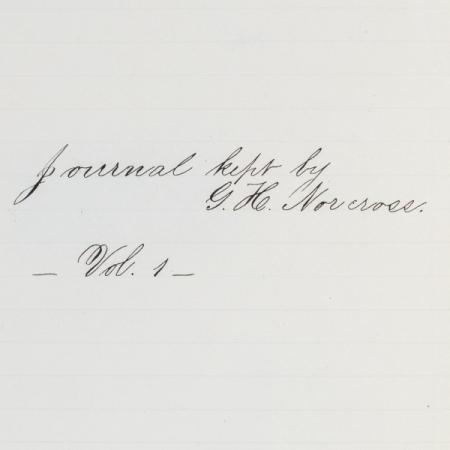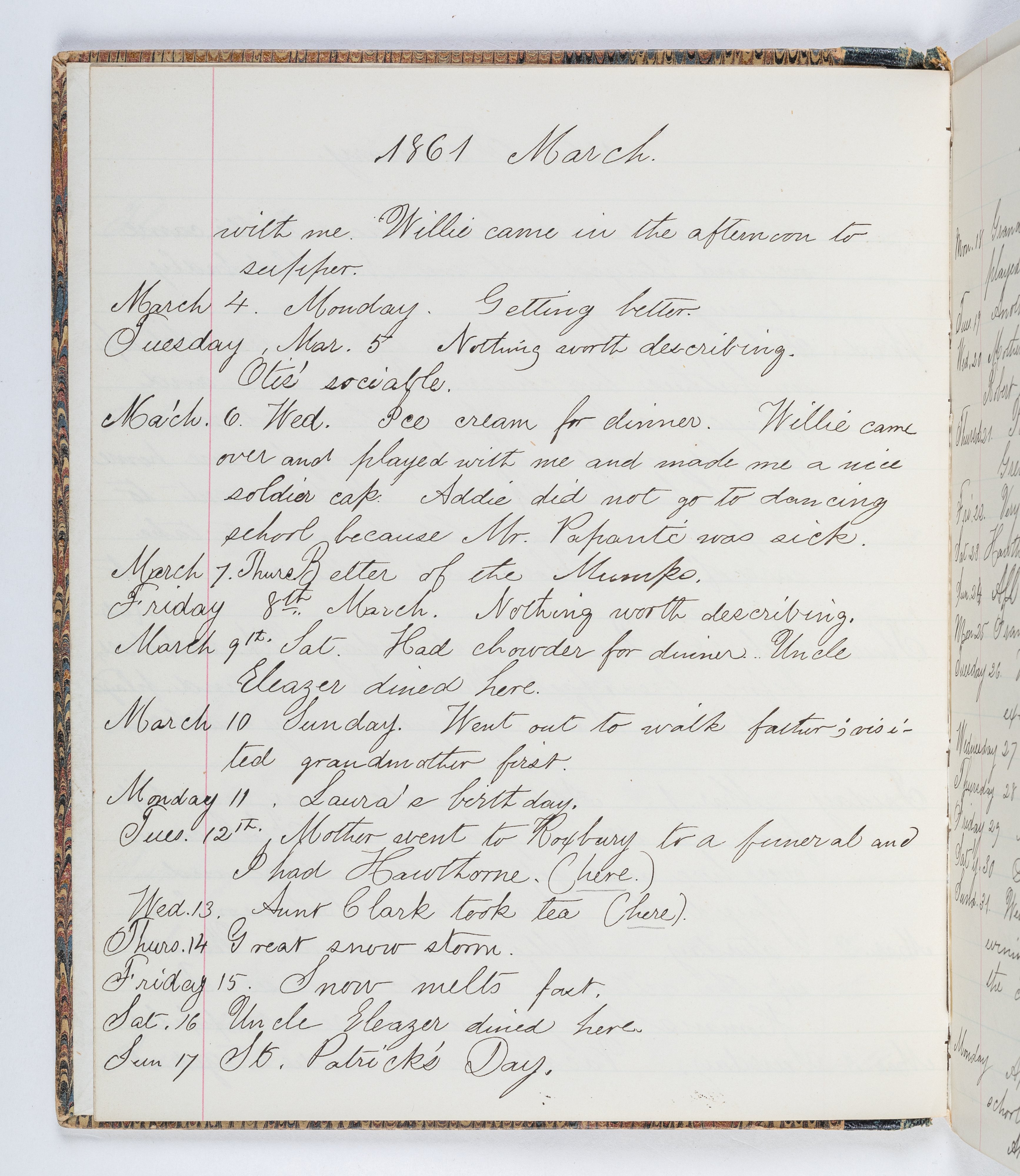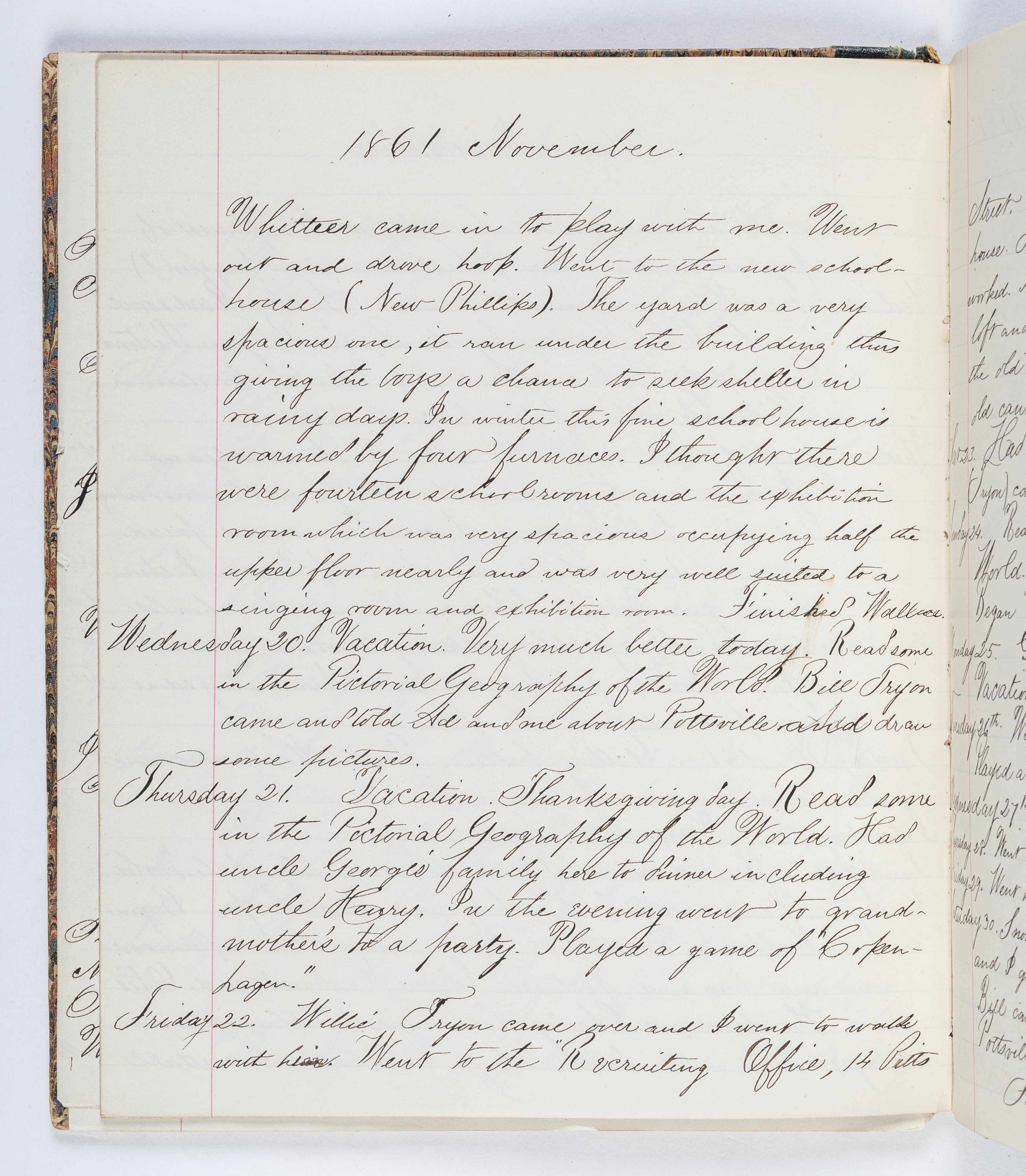
Opening page of Grenville's diary (1861)
Grenville Norcross (1854-1937) lived a life that was very different from Jenny’s. He lived in the city of Boston and his father ran for state office (alderman), which he mentions on December 9, 1861. For his seventh birthday, he received not only the diary in which he writes the entry below but also a pistol!
On February 3, 1861, Grenville wrote, “Present from Miss Watts of this book”, and on February 6, he wrote, “Present of a pistol from [friend] Willis Tryon.” He was also gifted a toy cannon on December 28 for Christmas that year (“Went to school. Went to the new Phillips Schoolhouse. Father came home. He gave me for a present a small brass cannon to fire peas”).
Grenville also experienced illness; he was sick with the mumps for the entire month of February and, like young children today, even got the chance to eat ice cream for dinner to soothe his sore throat. On March 6, he writes: “Ice cream for dinner. Willie came over and played with me and made me a nice soldier cap.”
 He celebrated many major holidays and enjoyed many other activities that a child might enjoy today. He celebrated Washington’s birthday on February 22, 1861, St. Patrick’s Day on March 17, 1861, July 4, Thanksgiving on Nov. 21, 1861, Christmas, and voting day on November 5, 1861 (when he had no school).
He celebrated many major holidays and enjoyed many other activities that a child might enjoy today. He celebrated Washington’s birthday on February 22, 1861, St. Patrick’s Day on March 17, 1861, July 4, Thanksgiving on Nov. 21, 1861, Christmas, and voting day on November 5, 1861 (when he had no school).

For fun Grenville attended the circus, made scrapbooks on April 9 and 11, 1861, went hiking on August 12 and December 11, and read many books. When he had the day off school for voting day on Nov. 5, 1861, for instance, he chose to read all day. Unlike Jenny, Grenville enjoyed geography and read many books on the topic, reading books called “Paris to Amsterdam” in July and a book about Ireland in October.
Diaries like those kept by Grenville can teach us how children lived, what they liked, how they experienced fun and tragedy, and shows us that, deep down, children from the past weren’t that different from us today.
Suggested Classroom Questions and Activities
Ask students to make a calendar for one of Grenville’s weeks that contains a holiday, possibly Thanksgiving. What day was Thanksgiving on in 1861? What day is Thanksgiving this year? Using a calendar, identify if Thanksgiving before or after Christmas? July 4? Grenville celebrated with a dinner, a party, and a game. Have students read Grenville’s entry and then write one of their own detailing how they celebrate.
[Massachusetts History and Social Science Framework MA1.T3 Recognize and document sequential patterns in seasonal events or personal experiences, using a calendar and words and phrases relating to chronology and time, (e.g., in the past or future; present, past, and future tenses of verbs).]
Have students point out where Boston is on a map. Boston is the capital of Massachusetts. Grenville went hiking at Mount Monadnock—with your help, have students find Mount Monadnock on a map and tell if it is north or south of Boston. Find Paris and Amsterdam on a map and tell if they are east or west of Grenville’s hometown of Boston. Have students draw what Grenville might have seen in the city and then on a hike.
[Massachusetts History and Social Science Framework MA1.T2 1. Explain that a map represents spaces and helps one identify locations and features. 2. Identify and use language for cardinal directions (north, east, south, west) when locating and describing places on a map; use a map to identify the location of major cities and capitals (e.g., Boston, Massachusetts, Washington D.C., Mexico City, Mexico) and investigate factors that explain why these locations became important cities. 3. Explain that a city that is called a capital is the center of government for a state or nation.]
Audio
Listen to several of Grenville's diary entries.